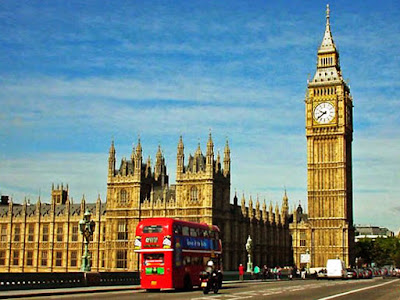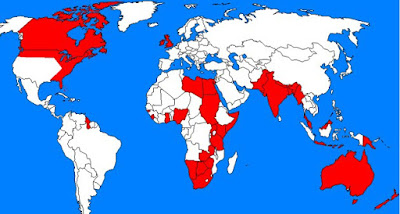Many of you may be scratching your head regarding how
England could have played such an unparalleled role in the historical development
of wine. Indeed, Bordeaux, Champagne,
Port, Marsala, and Madeira wines all owe their existence today to the
English. The reasons for this are intriguing
and encompass royal kingdoms, dowries, shipping fortunes, and wars.
Southwest
France becomes part of the British Empire
Eleanor of Aquataine's dowry gave England control of Bordeaux
Let’s start with how profound the English influence
has been in the Bordeaux wine business. Queen
Eleanor (wife of France’s King Louis VII) was one of the most powerful and wealthiest
women in Europe during the 12th century.
She later married King Henry II of England. Her dowry comprised all of Southwestern
France, including Bordeaux. This royal union
of France and England produced many things, including one of Europe’s most famous
monarchs (Richard the Lion-hearted, Eleanor and Henry’s son), as well as the English
love affair with Bordeaux wines.
As the entire region of Bordeaux came under English
rule, King Henry extended favorable trade privileges to Bordeaux's merchants to
ship their wines to England. This allowed Britain to receive Bordeaux wines far in advance of other European countries, and at far
better rates. While Bordeaux wine wasn’t
cheap, it was the preferred beverage of the English upper class and monarchy. Profits were massive as volume was extraordinary. Records from the early 1300’s show that wine
shipments between Bordeaux and England accounted for the largest shipping
traffic in the world at the time.
The
English birthed the Port wine industry
Port was shipped downstream on small boats for loading on England-bound ships
Then, came the Hundred Year War between England and
France. By now the English were smitten
with Bordeaux’s red wines which essentially became unavailable during the war. English importers sailed further south to the
northern part of Portugal for their red wines.
As the shipping journey was considerably longer than from Bordeaux, alcohol
was added to prevent spoilage during the lengthy journey. As British demand for Port (fortified wine with alcohol) grew, London merchants
and their families moved to Portugal to oversee their empires and control their
costs. Interestingly, many of these
original English families still control the Port industry today (e.g. Croft, Dow,
Graham, Symington and Taylor).
The
Brits put the bubbles in Champagne
2 absolutely profound elements were added by the Brits
Now, let’s fast forward from Portugal to the Champagne
district of Northern France. In the 1600’s
the wine produced in the Champagne countryside was “still” wine….there were no
bubbles. An English physician and scientist by the name of Christopher Merret
was the first to discover how to make sparkling wine. (This fact is often incorrectly attributed to
the French monk Dom Perignon). The
Brits further played another role in the groundwork for the Champagne
industry. It was England’s Royal Navy that
invented the thicker glass bottles to prevent Champagne bottles from exploding under
the higher pressures. Without these two
important English contributions, Champagne as we know it today wouldn’t exist.
English
merchants promoted Madeira
The Brits had a love affair with Madeira island
Next, there’s Madeira wine. Like Bordeaux, Port and Champagne, the
English played a pivotal role in the Madeira wine business, especially in the
shipping of these wines to the rest of the world. One of their most popular routes was to the British Colonies in America. Madeira was
considered to be the most important wine of the colonists. In
fact, it was so popular that George Washington used Madeira to celebrate the
signing of the Declaration of Independence.
Marsala’s
Origin is English
While Marsala can be an aperitif or dessert wine, it is also used in cooking
Marsala is another wine
that owes its global success to the English.
A fortified wine, like Madeira
and Port, Marsala is credited to a British merchant in the mid-1700’s who first
added distilled spirits to the local wines surrounding the city of Marsala in
Sicily. This fortification with brandy was
used to keep the wines from spoiling during their voyage on the ship back to
England. Marsala became so popular in
England that British merchants soon descended on Sicily to increase production
and commercialization of the beverage.
The Brits seed the New World
The British Empire in the 18th century reached nearly every corner of the globe
In addition to promoting wines in the American colonies, the Brits were also influencing wine habits in their Empire. Settlers from Britain immigrated to South Africa, Australia and New Zealand and with them they brought vines for making wine. Centuries later, while no longer a part of the British Empire, these countries are known for producing quality wine. And, their wines are widely exported back to England.
England is finally making its own wines
Churchill would be thrilled with England's new-found sparkling wine fame
Today, after more than 900 years of influencing the development of the modern wine business, England is finally producing its own wines. While production is still relatively small, English wines have captured the attention of the wine world by winning competitions and acing out many of the globe's most prestigious brands. England's sparkling wines have been getting lots of traction, beating out in blind tastings famous Champagne houses such as Veueve Clicquot, Tattinger and even Winston Churchill's favorite Champagne, Pol Roger.
In summary, more than any other nation in the world, England has influenced throughout history the course of wine. Wine-Knows will be visiting England in June
2019. Join us to learn about England’s
impressive new lineup of wines, in addition to Stilton cheese and Bombay
Gin. The trip is detailed at www.WineKnowsTravel.com.








No comments:
Post a Comment